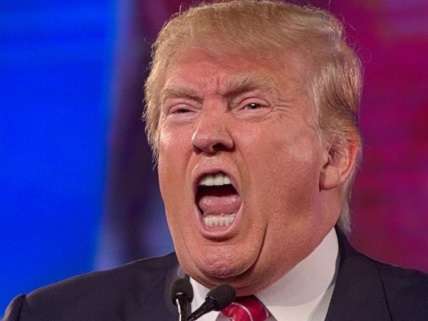Donald Trump Says NAFTA "Destroyed" America. Yeah, No.
Both Republicans and Democrats are now openly hostile to free trade. That ain't good, folks.

Among the many odd turns in the presidential election season is the unanimity among the remaining candidates that anything that smacks of free trade—or perhaps more accurately, freer trade—has done more damage to the United States than just about anything since the Civil War. On the Democratic side, Bernie Sanders has always pushed a hard-core, unapologetic protectionist line, whether he's talking about making cars or bobbleheads of the Founding Fathers. Hillary Clinton (whose husband we'll get to in a sec) dithered for a bit on the Trans-Pacific Partnership (TPP), a trade deal started under George W. Bush that she unfailingly promoted as Barack Obama's Secretary of State, before saying she was against.
The Republicans still running—Donald Trump, Ted Cruz, and John Kasich—scorn the TPP without seeming to know much about it, or their recent past. It took Rand Paul in an early debate to point out to the Donald that China was not part of the deal. Indeed, the whole point of the deal is to get around a dozen countries to work together to limit Chinese economic power. Oh well. Cruz was in favor of it for a while, just like he was in favor of Trade Promotion Authority, a negotiating tool that every president has used for every major trade deal over the past several decades. Kasich, the governor of a Rust Belt state that consistently ranks with Michigan in terms of job loss and sluggishness, has actually called for "fair trade," a euphemism for protectionism.
And so it shouldn't have been much of a surprise when Donald Trump called out the North American Free Trade Act (NAFTA) as the cause of all today's economic miseries. Here you go:
I call her Crooked Hillary. She's crooked. She'll be a horrible president. She knows nothing about job creation. Her husband signed NAFTA, which destroyed this country economically, I will tell you. You look at New York state, you look all over New England, you look at Pennsylvania, NAFTA was a disaster, her husband signed it. And it was a disaster for this country.
That trade deal, inked in the early 1990s, eased trade and other relations among the United States, Canada, and Mexico. Like TPP, it started under one president (Bush) and was concluded under another one from an opposing party (Bill Clinton). Those of us of a certain age will even remember an incredible debate when Al Gore—last seen in these pages fretting over dirty Prince lyrics and Satanism in popular culture during a 1985 Senate hearing—destroyed insurgent presidential candidate H. Ross Perot in a debate on free trade. On CNN's Larry King Live, of all places:
So, was the effect of NAFTA on the American economy? Correlation doesn't mean causation, yadda yadda yadda, but when NAFTA was passed unemployment was 6.7 percent; in 2008, before the recession kicked into high gear, it was under 5 percent. As Steve Chapman noted further in 2008, in the decade and a half after we loosened our borders with Mexico and Canada, the U.S. created a net total of 25 million jobs. And while it's true that manufacturing jobs—which had already been declining in the U.S. for decades—continued to slide, "average blue-collar worker's wages and benefits, adjusted for inflation, have risen by 11 percent under NAFTA."
Writing in the context of the 2008 campaign between Hillary Clinton and Obama, Chapman asked "Why are these people so ashamed of NAFTA?" It's still a question, except it's not just Democrats who bothered by NAFTA these days. Everyone running for president has a problem with Mexican goods or people, it seems. And what's even weirder is that Trump—again, who didn't even realize that TPP was an attempt to hem in China, not capitulate to it—seems to think that NAFTA makes companies more likely to move to China or something. This was also a talking point of Clinton back in 2008.
The death of the free-trade Democrat—since Bill Clinton and Al Gore, the species has effectively gone extinct—is bad. The death of free-trade Republicans, as evinced by the various anti-trade, anti-China, anti-Mexico, anti-immigrant sentiments voiced by Trump, Cruz, and Kasich may just well signal not just the closing of American borders but American minds to the benefits of trade and globalization.
As Ronald Bailey documented for Reason last year, "globalization is good for you." The general and ongoing reduction in trade barriers and loosening of migration restrictions since the end of World War II not only resulted in a 30-fold increase in the amount of goods and services trafficked around the globe, it has led to longer lives, fewer wars, less child labor, emancipation of women, higher incomes, less poverty, and faster economic growth. On that last point:
A 2008 World Bank study, "Trade Liberalization and Growth: New Evidence," by the Stanford University economists Romain Wacziarg and Karen Horn Welch, found that trade openness and liberalization significantly boost a country's rate of economic growth.
The authors noted that in 1960, just 22 percent of countries representing 21 percent of the global population had open trade policies. This rose to 73 percent of countries representing 46 percent of world population by the year 2000. The study compared growth rates of countries before and after trade liberalization, finding that "over the 1950–98 period, countries that liberalized their trade regimes experienced average annual growth rates that were about 1.5 percentage points higher than before liberalization" and that "investment rates by rose 1.5–2.0 percentage points."
Protectionism doesn't just lend itself to ugliness (recall Trump's characterization of Mexicans as rapists, drug dealers, and worse). It creates a poorer world. And now that the leading candidates of both parties are channeling the inner Smoot-Hawleys, we've got a lot work in front of us on this score.


Show Comments (192)